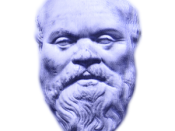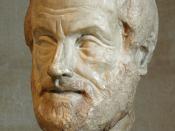In Nicomachean Ethics, Aristotle focuses on the importance of behaving virtuously and developing virtue rather than committing specific good actions. He emphasizes the importance of context to ethical behavior because what might be right in one situation might be wrong in another. Aristotle believed that happiness is the end of life and that as long as a person is striving for goodness, good deeds will result from that struggle, making the person virtuous and therefore happy.
Aristotle presents the virtue of magnanimity, or greatness of soul, as a summit of the moral life. It presupposes possession of all the other virtues, for high-mindedness is the quality of those who think they deserve great things and actually do deserve them. High-mindedness, by definition, implies greatness. It involves maintaining high standards in all things and setting an example for the community. The high-minded person will be deserving of honor and respect but he will avoid vanity and claiming great things for himself.
He will not seek praise and recognition from others but neither will he accept slander and defamation without appropriate retaliation. A high-minded man will speak what he thinks because he cares for truth more than reputation. He will not be inclined to admiration, bear grudges or indulge in personal conversation and will not speak evil, even of his enemies, except when he is insulted. His ambition will be to exemplify the good life in the society of which he is a part. He will accept honors when they are truly deserved but he will be concerned to see that they are bestowed in the right amount. The magnanimous person measures up to his own claim to greatness, a fool does not. The proud man, since he deserves most, must be good in the highest degree; for the better man...


